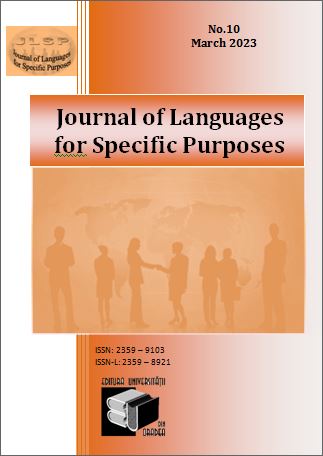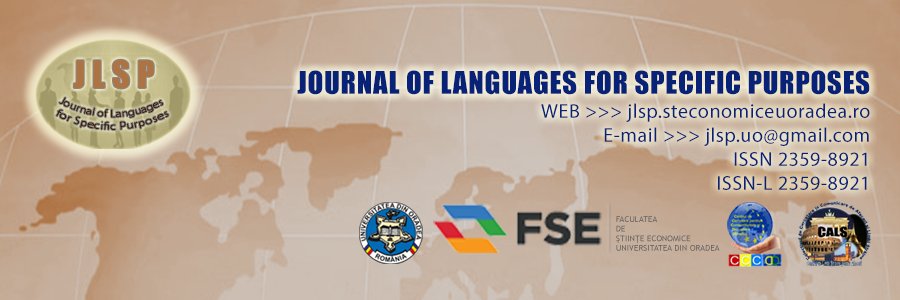10th Issue – March 2023

Full volume of The Journal of Languages for Specific Purposes (JLSP) – 10th Issue – March 2023
Title: CULTURE MATTERS: DESIGNING AND DELIVERING A FRENCH FOR SPECIFIC PURPOSES (FSP) COURSE FOR THE MEDICAL SOFTWARE SECTOR IN BELGIUM
Author(s): Sage Goellner
Abstract: This article describes the creation of French for specific purposes (FSP) materials for the medical technology sector for in a week-long course designed for non-specialist French speakers going to Belgium on a three-year medical software project. Language for specific purposes (LSP) generally incorporates general cultural competence, which has long been considered a central component of foreign language education, along with developing competencies and skills based on employers’ requirements, language awareness, and professional competencies. Alongside key linguistic skills – for example, vocabulary building in a certain area such as law, medicine, or technology – LSP courses need to equally consider individual regional cultural elements including linguistic variants as an integral part of their specific purpose, instead of adding it as an ancillary aspect. Because of the interconnectedness of language and culture, LSP educators must explicitly and methodically consider cultural familiarity as an outcome by integrating it into the needs analysis, development, delivery, and conclusion of the course. In this example, the instructional team collected and modified materials from textbook and web resources to create an FSP course that included an overview of French medical and technological terminology as well as an introduction to Belgian French, relevant cultural material, and a focus on linguistic authenticity. Using qualitative methods, this article presents the ways in which the FSP course foregrounded culture and demonstrates specific examples from the pedagogical materials designed for students. This curriculum model can serve as a framework for those interested in infusing their FSP curriculum with cultural relevance as an additional specific purpose.
Keywords: French for Specific Purposes; Belgium; pedagogy; culture; designing and implementing; medical software sector.
Pagination: 7-15
Title: EDUCATION DURING COVID-19 PANDEMIC IN ROMANIA AND ABROAD
Author(s): Monica Condruz-Bacescu
Abstract: The purpose of the paper is to show the changes underwent by the education system worldwide during covid-19 pandemic both in schools and universities. The education system is undergoing radical changes, with a significant increase in e-learning, distance learning through digital platforms. The main problem with digitizing education is that not all children/students have access to the Internet or do not have the necessary technology. The closure of schools and universities, in the context of the COVID-19 pandemic, has had negative consequences both on children/students’ educational progress and on their emotional health and, moreover, on their online safety. One of the urgent measures recommended was to support families affected by poverty, so that all children/students participate equally in the online educational process, providing them with digital devices such as laptops and a secure wi-fi connection. After the initial shock, teachers, professors and members of administrative and technical bodies in education systems around the world reacted in a truly extraordinary way, trying to transfer the entire teaching activity to the online environment and, in just a few weeks, to become familiar with the operation of digital platforms such as Zoom, Google Meets and Microsoft Teams, which in most cases they were not even aware of before this crisis. Most of them have adapted surprisingly well to the new systems, appreciating the advantages they bring and trying to quickly overcome the inherent problems. The pandemic also had negative effects on interpersonal relationships, as students/children no longer have the context to work and collaborate as a team to develop a task. An undesirable conclusion is that, regardless of the country, the poorest and most marginalized children are in danger.
Keywords: education; covid-19 pandemic; digitization; university system; students; innovation.
Pagination: 17-29
Title: THE INTERRELATIONSHIPS BETWEEN STUDENTS’ PERCEPTIONS OF FOREIGN LANGUAGE SKILLS AND INTERCULTURAL COMMUNICATIVE COMPETENCES
Author(s): Tímea Lázár, János Farkas, Ildikó Tar, Mária Czellér
Abstract: Globalisation and internationalisation have caused massive changes in several fields of life worldwide, with significant transitions in Hungary. The advent of multinational companies, including SSCs (Shared Service Centres), has impacted the labour market both internationally and domestically. The activity and the management of these companies have increasingly required good intercultural communication competencies and a high level of foreign language skills from graduate entrants. Considering multinational companies’ predominantly culturally diverse environments, where employees can only complete their jobs effectively and successfully if they possess the necessary skills, the expectations are hardly surprising. Internationalisation has also influenced university education. International students often come to Hungarian higher education institutions to participate in international programmes offered by universities. Excellent intercultural communication competencies and foreign language skills may be the key to students’ success.
Keywords: intercultural communication competencies, university language teaching, non-parametric statistical procedure, foreign language use at work.
Pagination: 31-48
Title: „MEINE LYRIK SEI IN MEINER PROSA ENTHALTEN.“ LINGUISTISCHE ÜBERLEGUNGEN ZUR LYRIK UND ZUR PROSA VON HANS BERGEL
English Title: “MY LYRIC IS CONTAINED IN MY PROSE” – ABOUT THE LANGUAGE IN THE LYRIC AND PROSE OF HANS BERGEL
Author(s): Anita Szell
Abstract: Writing about the lyric of Hans Bergel is an unusual challenge for the researcher. The Transylvanian author, who emigrated to Germany, is known especially for his prose texts; his lyric falls on the second place in his writings, but this doesn’t mean, that Hans Bergel’s poems aren’t successful lyrical texts. He describes in them a variety of places, in which the atmosphere and colours reflect not only the lyrical side, but also the narrative side of the author. Bergel approaches the description of a place contemplatively and reflects on its spiritual correlations. His astonishing wealth of thoughts manifests itself in an inspired stream of language to which he entrusts himself. Each of Bergelʼs literary statements has in common the musicality and richness of the language. In everything Bergel writes, one can find his entire personality, his rich experience with literature and the world. He registers the experiences, feelings and thoughts that he has recorded along his life path and he relives his experiences through language. Therefore a story cannot exist without the music of the language, a poem without philosophical and essayistic incursions. The research on the contemporary Transylvanian literature does not focus on this side of Hans Bergel, but there are a few philologists, who refer concisely to the lyric of the author. This paper with the above title would like to widen this research, by revealing new aspects of the work of Hans Bergel. The study of Transylvanian-German literature as minority literature has subject-related risks, because research focuses from the outset on a specific context and operates within a quasi-prescribed framework. One wonders, however, whether it is possible to break out of this framework with either traditional or modern means, and suggest new ways of addressing Bergelʼs work as a theme. This paper seeks to answer this question.
Keywords: Bergel, lyric, prose, linguistic structure, visuality, essayistic excursions.
Pagination: 49-61
Title: DISKURSMARKER IN DER INTERIMSPRACHE BEI DEUTSCHSTUDIERENDEN IN DER REPUBLIK NORDMAZEDONIEN
English Title: DISCOURSE MARKERS IN THE INTERLANGUAGE BY STUDENTS OF GERMAN IN THE REPUBLIC OF NORTH MACEDONIA
Author(s): Biljana Ivanovska, Gzim Xhaferri
Abstract: The study presented in this paper is part of a research project entitled “The role of explicit instructions in developing pragmatic competence in learning English and German as a foreign language,” currently being conducted at the “Goce Delchev” University in Shtip, Republic of North Macedonia. This study examines the use of pragmatic markers by Macedonian students of German. Speakers use them to achieve smooth speech flow and help their conversation partners appropriately decode the meaning of their utterances. The study describes the investigation of the discourse markers in the interlanguage of the Macedonian foreign language students. The interlanguage refers to the language used by students during the process of learning a foreign language. Investigating discourse markers in the interlanguage of the Macedonian foreign language students could contribute to improving our understanding of their use of discourse markers in the context of foreign language learning. This contribution attempts to analyze the use of pragmatic markers in the speech of the Macedonian learners of German and to present their frequency and function in the language. The analysis was conducted with 30 participants who are studying German at the Department of German Language and Literature at the “Goce Delchev” University in Shtip. The analysis of the data examines whether and how explicit instructions influence the use of pragmatic markers. The results of this study can help learners and teachers better understand the role of explicit instructions in learning and teaching the German language and develop more effective teaching methods.
Keywords: pragmatics; discourse markers; interlanguage; pragmatic function and frequency of use.
Pagination: 63-75
Title: ITALIANO LINGUA TERZA. APPRENDERE E INSEGNARE L’ITALIANO SPECIALISTICO: IL CASO DEL LINGUAGGIO MEDICO
English Title: ITALIAN AS A THIRD LANGUAGE. LEARNING AND TEACHING ITALIAN FOR SPECIAL PURPOSES: THE CASE OF ITALIAN FOR MEDICINE
Author(s): Katarzyna Maniowska
Abstract: In the present paper the issue of teaching medical language in the context of learning Italian as LS will be analysed. The first part of the article consists of general notes on different definitions of the Italian for specific purposes, as well as different aspects of teaching process (teaching materials, time, language abilities in the field of Language for Specific Purposes). The second part of a practical nature analyses the aspect of how the levels of knowledge of the Italian language are interconnected with the ability to understand specialized texts. For the purposes of the research, a study was conducted on a group of LS Italian learners with different linguistic abilities, as well as on a group of native speakers. A short questionnaire of 10 gradually difficult questions was submitted to the heterogeneous group of Italian speakers and LS Italian learners. It was assumed that native speakers would answer more questions correctly. It’s interesting to see though, that the results of the research disproved the initial hypothesis.
Keywords: Italian for Medical Purpose; Language for Specific Purposes; language skills.
Pagination: 77-96
Title: CARMEN BUENO MUÑOZ / LUIS R. MURILLO ZAMORANO / JOSḖ ÁNGEL LÓPEZ SÁNCHEZ: GAMIFICATION AND ARTIFICIAL INTELLIGENCE DURING COVID-19: CASE STUDIES IN HEALTH AND EDUCATION
Author(s): Andrea Hamburg
Abstract: Book Review
Keywords: Book Review
Pagination: 97-99
Title: JULIAN BÖHNISCH: CULTURE’S INFLUENCE ON THE WEBSITES OF GERMAN AND
CHINESE COMPANIES. AN ANALYSIS OF CULTURAL DIVERSITY ON THE INTERNET
Author(s): Andrea Hamburg
Abstract: Book Review
Keywords: Book Review
Pagination: 101-104
Title: SIMON WILLIAMS’ DISFLUENCY AND PROFICIENCY IN SECOND LANGUAGE SPEECH PRODUCTION
Author(s): Ioana Claudia Horea
Abstract: Book Review
Keywords: Book Review
Pagination: 105-110





